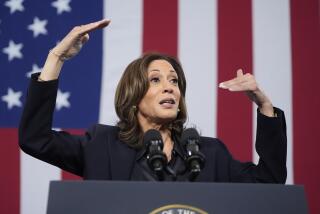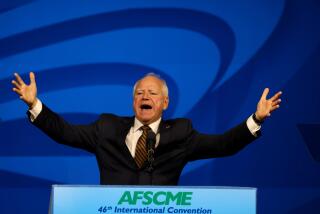Teamster Split Boosts Reform Candidateâs Odds : Labor: Backers of two Establishment hopefuls vying for the powerful unionâs presidency say outsider Carey would win if votes were cast today.
ORLANDO, Fla. â The most surprising development from last weekâs historic democratic Teamsters convention is the growing acknowledgement that a venomous split between two presidential candidates from the unionâs executive board is giving reform candidate Ron Carey a realistic chance of winning Decemberâs rank-and-file election.
Union kingmakers would have squashed such a split at past conventions.
The prospect of an outsider like Carey taking control of the nationâs largest and most powerful union terrifies the Teamstersâ Establishment, which has long dismissed Carey as a shrill, superficial demagogue who lacks the nuts-and-bolts sophistication needed to run the union.
Carey, the head of a New York parcel-delivery local, has for years been harshly critical of Teamster national leaders for allegedly failing to protect membersâ interests. If elected president, he would likely replace hundreds of Teamster staff members and attempt to radically change the way the unionâs headquarters in Washington manages the $80-million administrative budget.
And so it was with considerable gloom the other day that an experienced Teamster hand, aligned with the presidential campaign of Walter Shea, a union vice president from Washington, D.C., who represents the unionâs Old Guard, East Coast faction, mulled what would happen if the rank-and-file election were held now.
âCarey wins,â he said soberly.
The convention, the biggest government-supervised convention in U.S. labor history, adjourned Friday. Delegates spent the week arguing with each other and tinkering with their constitution in ways that would have made their old, iron-handed leaders gasp. They even voted to sell off the unionâs four private jets, ever a symbol of the unionâs decadence.
The 5,000 delegates and guests, and tens of thousands of other activists within the union, now embark on one of the most daunting propositions in the history of union politics: Decemberâs election, the first time members have had a say in who runs their union.
The unionâs 1.6 million members--more eligible voters than are found in 26 states--are scattered across tens of thousands of truck âbarns,â factories, warehouses and other work sites.
Reaching them effectively with a political appeal is virtually impossible: A single mass mailing would cost $300,000 to $500,000. Their apathy is enormous: Earlier this year, only about 25% voted in elections for convention delegates.
If money and influence were the sole measure, R. V. Durham, a 59-year-old union vice president from North Carolina who runs the Teamster freight division, would be the overwhelming favorite. As it is, Durham, who has begun to insert the words âreformâ and ânew directionsâ into his speeches, is clearly the front-runner. On Thursday he won nomination votes from 1,001 elected delegates, compared to 574 for Shea and 289 for Carey. He also raised $140,000 at the drop of a hat last week with a $100-a-person poolside breakfast.
During the convention, the Durham and Shea campaigns churned out a series of antagonistic fliers tearing down each other.
Shea, 61, blasted Durham as a tool of much-criticized outgoing Teamster President William J. McCarthy and as a Southerner who is alien to the unionâs Northern industrial base. Durham attacked Shea as representing âthe wreckage of our past,â a lifelong bureaucrat and spineless follower of Joseph Trerotola, the diminutive 82-year-old New York Teamster leader who is widely credited with orchestrating the selection of several past Teamster presidents.
If Durham and Shea continue to point out each otherâs weak spots in front of the unionâs membership--and there is no indication their tone will change--Careyâs chances would grow stronger.
âCarey has an excellent chance,â admitted Walt Petitt, president of a Teamster food-industry local in Los Angeles, who is supporting Durhamâs campaign.
âThe membership wants a new day,â said the experienced pro-Shea Teamster, who discounted the nomination votes here because most delegates were union local officials with a personal stake in the presidential election.
âWhat these guys donât realize is that the people (who) are gonna make this decision are average, good, strong, working Americans who drive a truck or push a broom, who say: âEvery time my kids go to school they get teased because Iâm a Teamster. Iâm gonna change that.â All they know is that they would like to see their union off the front page and get away from âTeamsterâ being a dirty word.â
Both Durham and Shea have a network of union local presidents and appointed business agents in some 600 Teamster locals who will perform crucial lobbying and fund raising among the rank and file.
Carey, by contrast, has bodies, many of them filled with an almost religious zeal.
In a speech to the convention Friday--the first time all week that Carey or his delegates spoke on the floor without being booed by Shea and Durham delegates--Carey described himself as the candidate of âthe forgotten Teamsters,â members who âbelieve in the promise of the labor movement but no longer believe in the promise of the Teamsters Union . . . forgotten by leaders who will retire on pensions paying more in a single week than the pensions of our forgotten Teamsters will be paid in an entire month.â
Carey began his campaign 21 months ago, shortly after Shea and other members of the Teamstersâ executive board signed a consent decree in federal court that mandated government oversight of the union and elections open to all members. In exchange, the Justice Department dropped a major racketeering suit against the unionâs leadership.
Within a year, Carey had collected 100,000 Teamster signatures in support of him. Those signatures form an important base of support in a campaign in which less than 500,000 Teamsters--perhaps as few as 300,000, according to more pessimistic estimates--figure to vote.
Carey, 54, is a former United Parcel Service driver who has been president of a New York local with about 7,000 members--mostly UPS drivers--for 23 years. He boasts a corruption-free reputation and a modest $45,000 salary.
He spent most weekends last year flying to dozens of states to campaign, aided by squads of volunteers from Teamsters for a Democratic Union, a 10,000-member, 15-year-old reform group that long fought without success against the Teamster leadership--until this convention.
Thanks to the delegate-election procedures mandated by the consent decree, TDU and the Carey campaign sent more than 250 pro-Carey delegates here, creating a revolution in the previously monolithic chemistry of the convention.
Both the Durham and Shea campaigns sought support from TDU delegates on some constitutional votes--literally the first time that any branch of the Teamstersâ Establishment had considered TDU members worth talking to. Shea delegates joined TDU in raising strike benefits. Durham delegates offered the amendment to sell the unionâs jets, a longtime TDU demand.
After Careyâs name was placed in nomination, TDU delegates demonstrated by marching around the hall carrying Carey on their shoulders and chanting as they walked by stone-faced Durham and Shea delegates.
âThe partyâs over,â they cried.
More to Read
Get the L.A. Times Politics newsletter
Deeply reported insights into legislation, politics and policy from Sacramento, Washington and beyond. In your inbox three times per week.
You may occasionally receive promotional content from the Los Angeles Times.










